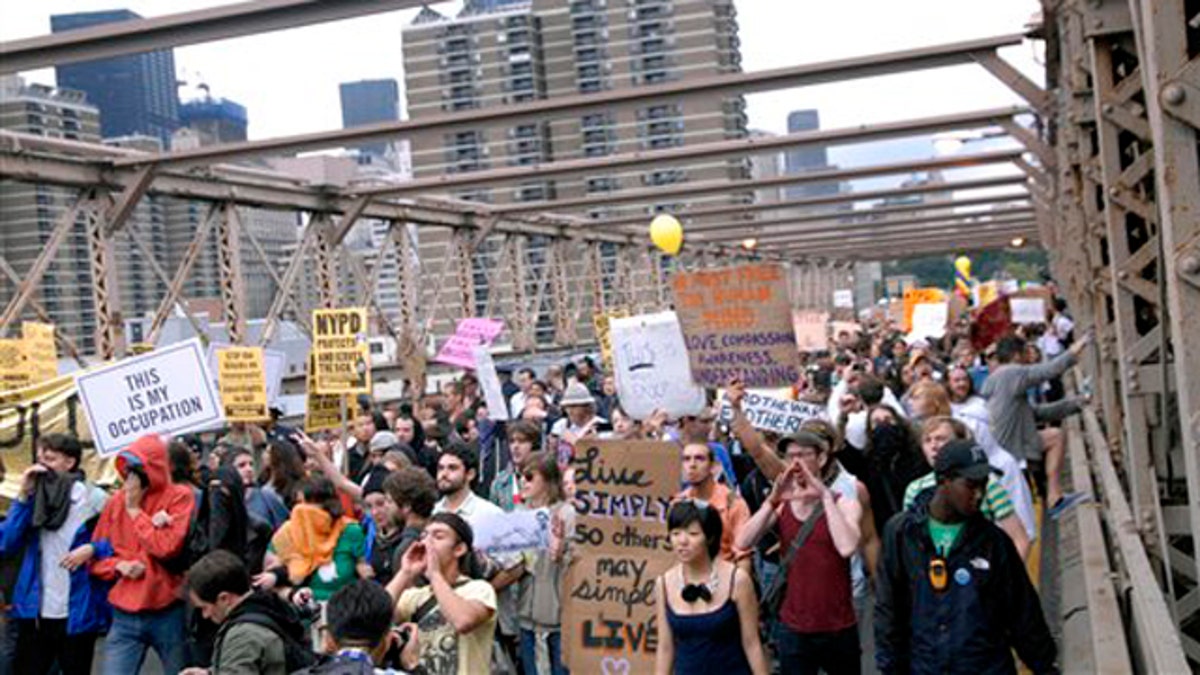
In this Oct. 1 photo, protesters walk onto New York's Brooklyn Bridge before police begin making arrests. (AP)
Protesters who've gathered under the banner of "Occupy Wall Street" are looking to light a movement, but as hundreds of demonstrators rally against corporate "greed and corruption," they have a long way to go before becoming a defined cause like the Tea Party, say political analysts.
That's not to say they aren't trying.
In three-weeks time, the Occupy Wall Street crowd has attracted high-profile attention. It has the purported backing of unions like the Teamsters and DC-37, New York City's largest public employees union. It has attracted Hollywood types who love a good cause to drop in on; and has even generated a discussion group at a convention of liberal leaders taking place in Washington, D.C., this week.
But the movement has at least one major obstacle to becoming a political force -- the administration it would protest is on its side.
"I would simply say that to the extent that people are frustrated with the economic situation, we understand. And that's why we're so urgently focused -- trying to focus Congress's attention on the need to take action on the economy and job creation," White House spokesman Jay Carney said Monday, responding to a question about where President Obama's sympathy lies.
David Avella, president of Republican recruiter GOPAC, said protesters on the left today lack the "common enemy" they tagged during the George W. Bush administration.
And despite frequent clashes with Republicans, the White House has passed several major pieces of legislation that progressives liked -- even if they weren't as sweeping as initially envisioned.
In 2006 and 2008 when Democrats took control of power in Congress and the administration, "it was much easier for the progressives to rally like-minded individuals who wanted to ... defeat the Bush agenda," Avella said.
In response to progressive successes after the elections, the Tea Party movement evolved in 2009 to become perhaps a once-in-a-generation force. Motivated by a confluence of factors it was primarily fueled by anger at "crony capitalism" and too-big-to-fail policies that propped up the financial industry.
Since then, individual Tea Party groups have evolved into a mature national network with a variety of priorities and platforms, but its collective anger and untiring commitment are still simmering -- the result of few changes in Washington's overall behavior.
Similarly, the Occupy Wall Street set is also fighting crony capitalism and too-big-to-fail policies that propped up the financial industry. The difference, however, may be in their demands.
Tea Partiers want Washington to lay off and let the free-market system self-correct. Occupy Wall Street -- at least, according to some at the protests -- is looking to engineer an overthrow of the free-market system.
The protesters are "trying to accomplish the demolition of capitalism," one demonstrator told Fox News. Another said the group wants to replace capitalism with a different economic model.
Summed up on the Occupy Wall Street website as an Arab Spring-inspired protest against corporate greed, protesters have also flailed against student loans, global warming and even the Tea Party-favorite Federal Reserve.
"I just don't see how it goes anywhere," said Sal Russo, strategist with the Tea Party Express, suggesting the demonstrations have too much of a "Marxist" appeal.
"Most Americans understand that to have an employee, you have to have an employer," Russo said.
The sustained frustration among the Occupy Wall Streeters has given rise to greater visibility. What started in New York City has spread to dozens of other cities, including Denver, Albuquerque, Chicago, San Francisco and Boston.
The other locations don't necessarily carry the intensity of the 700 protesters arrested on the Brooklyn Bridge over the weekend in New York, at least not yet. According to one local report, a protest in St. Louis comprised less than a dozen people outside a Federal Reserve Bank.
But Democratic strategist Dan Gerstein said the potential is there for "a huge opening for a populist alternative" to the Tea Party.
"I don't think it's there yet, but there is tremendous potential," said Gerstein, who noted that Occupy Wall Street needs a sponsor.
"They're missing money, like the Koch brothers and FreedomWorks" who helped back the rise of the Tea Parties, Gerstein said. "They need someone like a Ross Perot who can just say, 'We're mad as hell and not gonna take it.'"
Aside from message and sponsorship, Occupy Wall Street has other hurdles that the Tea Party has already demonstrated to be potential liabilities. If the protests become too disruptive they could turn off independents.
And it remains to be seen whether the protests will alienate the group into the fringe, leaving Obama looking like a moderate and pushing him toward compromise with the GOP, or whether the president will use the outcry to better position himself as a defender of the middle class -- something he's tried to do recently while rallying his base constituencies.
"There's still an opportunity for him to take leadership here," Gerstein said.




